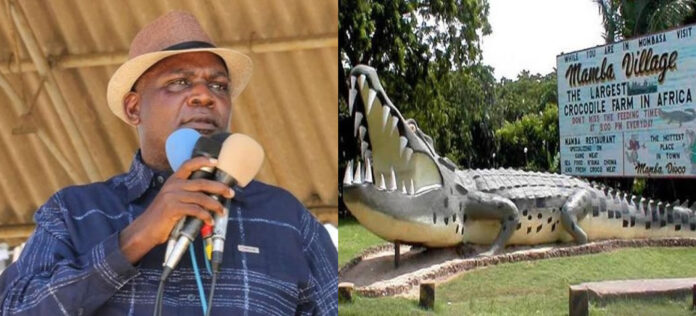Mombasa is famous for its beautiful beaches and luxurious hotels, but it also has other attractions that are often overlooked. One of these attractions is Mamba Village, the largest crocodile farm in Africa.
The farm, founded by Hezron Awiti, is home to over 10,000 crocodiles, and it has become a significant source of crocodile skins and meat, which are exported to various countries worldwide.
Awiti acquired the farm in 1995, which was initially used as a quarry and dumpsite before he converted it into a conservation area for crocodiles.
He saw an opportunity in commercial crocodile farming after learning that crocodile skins were in high demand in overseas markets. The skins were used to make high-end fashion accessories such as handbags, wallets, and belts for luxury brands such as Hermes, Louis Vuitton, Gucci, and Chanel.
While on his trips abroad, Awiti noticed that only the well-off people could afford items made from crocodile skin. He saw this as an opportunity to venture into commercial crocodile farming and switched to this venture instead of depending on tourism, which is seasonal. He currently exports the crocodile skins to markets in Japan, Israel, and South Africa.
According to Awiti as of August 2017, he had invested over 250 million Kenyan shillings in the farm, which comprises 21 ponds, each measuring between 50 and 100 feet, with a capacity to hold up to 30,000 crocodiles.
The farm breeds crocodiles using an incubator, which allows them to determine the sex of the crocodiles by controlling the temperature. A temperature setting of 30 degrees and below produces a female crocodile, while setting temperatures of between 32 and 33 degrees results in male crocodiles.
The farm has more than 10,000 crocodiles, ranging from younger ones aged one year to the oldest crocodile, known as “Big Daddy,” which is over 110 years old. The crocodile farm produces over 14,000 eggs a year, but they are not sold; instead, they are hatched, and the hatchlings are sold to other farms in the region and beyond.
Mamba Village has become a popular attraction in Mombasa, with visitors coming to see the crocodiles and enjoy the mouth-watering crocodile meat at the farm’s restaurant. The farm’s restaurant serves crocodile steaks and mishkaki, a popular East African delicacy made from grilled meat.
How you can survive in Nairobi with Sh. 20,000 net salary
A quarter kilogram of crocodile meat costs 1,000 Kenyan shillings at the restaurant, while two pieces of mishkaki with accompaniments cost 500 Kenyan shillings.
The Mombasa crocodile farm is not only a tourist attraction but also a profitable business that generates income for Mr Awiti and his employees.
It is a unique venture that has made him one of the African farmers who feed luxury brands with skin to make fashion accessories for the rich.









